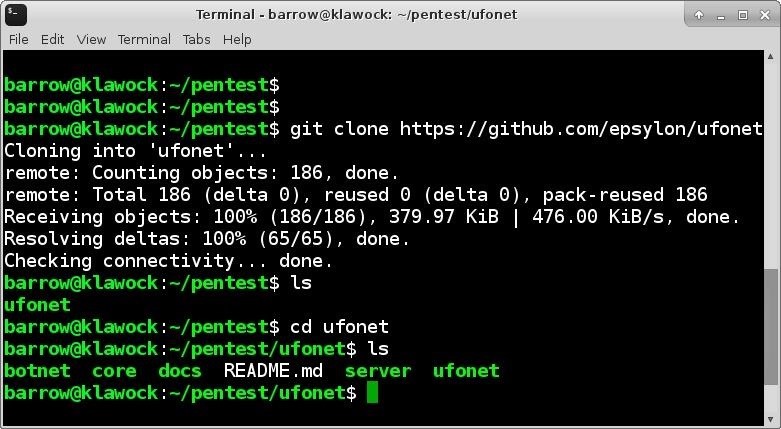
With the release of the Mirai source code, botnets are back in a big way. In the early days of botnets, zombies (infected hosts) would report to IRC (Internet Relay Chat) channels for CNC (command and control) instructions. Modern botnets have evolved, but they continue to use the same concepts as their predecessors.
The basics of botnets are simple. The first step is to find lots of machines that are vulnerable to attack. In the case of Mirai, IoT's devices with hardcoded or default credentials set. Next, the vulnerability is exploited. In some cases, this means installing a RAT (remote administration tool). Infected or vulnerable machines are then controlled by a bot herder with a CNC tool. Often, botnets are custom-coded and the source is kept secret. The reason for this is the profit involved. Botnets are used for DDoS, bitcoin mining, data theft, spam distribution, and ad fraud. Some bot herders even rent their botnets out by the minute!
In this article, we will be examining UFONet - DDoS Botnet via Web Abuse "a free software tool designed to test DDoS attacks against a target using 'Open Redirect' vectors on third party web applications like botnet." I will be walking through the steps as if I were going to launch an attack on a host. This open-source botnet is easy to install and run, and it's capable of searching out vulnerable hosts, testing them, cataloging them, running DDoS attacks, and more.
Get the Source
Our first step is to get the UFONet source, so open your favorite terminal emulator and clone the repo:
git clone https://github.com/epsylon/ufonet
cd ufonet

We will also need to ensure that we have all of the dependencies required to run this. We will need Python >2.7.9, python-pycurl, and python-geoip. In order to install these dependencies in a terminal on a Debian-based system such as Kali Linux, simply run:
sudo apt-get install python-pycurl python-geoip
Next, we will update UFONet:
./ufonet --update

Configure Tor (Optional)
If we were using UFONet to DDoS a target, we would set up Tor and run:
./ufonet --check-tor
Since we are not actually going to be attacking any targets or exploiting any hosts other than those on our local network, we can skip Tor configuration.
Find Vulnerable Hosts
Now we'll use the search function to find vulnerable hosts. UFONet uses only Bing by default to locate vulnerable hosts. This can be changed with flags. I will be using all of the available engines built into UFOnet to search for a vulnerable host.
./ufonet -s 'proxy.php?url=' --sa
This command tells UFOnet to search for sites containing "proxy.php?url=", using all built-in search engines. Sites containing "proxy.php?url=" may be vulnerable to open redirects. You can also load search strings from a text file with the command:
./ufonet --sd 'botnet/dorks.txt'
This command uses UFOnet's dorks.txt as a list of strings to search for potential open redirect vulnerabilities.

Since none of these sites have asked me to test whether or not they are vulnerable to open redirects, I did not check the hosts. If we had selected "Yes," UFONet would have checked the remote hosts ensuring that they are vulnerable to open redirects.
Another option for locating targets is downloading the community zombie file from UFONet. I can't verify the validity of this list, but it's worth a shot.
./ufonet --download-zombies

Testing
We now have a large list of zombies available to us. Since the hosts provided by the community are not under my control, I cleared the community hosts that I downloaded from my bots list and set up a vulnerable page in a VM (virtual machine). This page is a simple open redirect and belongs in the botnet/zombies.txt file.
UFOnet stores data on vulnerable hosts in text format in the botnet folder. Each text file has a themed name, and represents a different form of open redirect.
Zombie: HTTP GET 'Open Redirect' bot
Droid: HTTP GET 'Open Redirect' bot with parameters
Alien: HTTP POST 'Open Redirect' bot
UCAV: These sites check whether the target of the DDoS is up
Dorks: A list of potentially vulnerable search strings
Next, I test that my VM is vulnerable to an open redirect.
./ufonet -t botnet/zombies.txt

Looks like it's working.
Inspect Our Target
We may want to inspect our target for large files. Luckily, UFONet has the functionality built in:
./ufonet -i http://192.168.1.97
Focusing on larger files is not a necessary step, though it may eat more bandwidth from the target site wreaking a bit more havoc. Since my VM consists of two hosted pages, the default Apache page, and the vulnerable open redirect page, this command isn't going to discover anything major. Though, in some cases, you may discover large files.

I inspected my vulnerable web server. It looks like the largest file on my web server is "ubuntu-logo.png". It appears UFONet has followed an external link off my site though. If I hadn't read through the information presented to me, I could have potentially attacked the wrong target! Tools can report the wrong information, so it's important to pay attention.
Launch an Attack
Lastly, I will launch:
./ufonet -a http://192.168.1.97 -r 10 -b "icons/ubuntu-logo.png"
In this command we launch UFONet, and the -a flag specifies the target to attack. The -r flag specifies the number of times each host should attack. The -b option selects where to make requests on the target.
When we execute this command, UFONet will attack the target 10 times for each zombie. If you have a list of 100 zombies, it would launch 100 zombies times 10 rounds for a total of 1,000 requests to the target. Specifically, it's requesting the largest file on the site "ubuntu-logo.png". That number may seem small, but remember with a bit of web scraping and peer-to-peer sharing, it should be easy enough to launch a respectable DDoS attack.

In this case, I'm getting a target down message. Obviously, my target is still up. Since I'm attacking a local VM from within my own home network, sites like isup.me that check whether a website is up, will detect it as down.
Conclusion:
UFONet is just one of many DDoS attack platforms. A search on GitHub or Google for botnets should turn up some interesting results. I would never run a botnet app without thoroughly reading through the source. Without an understanding of the code, it's quite possible that you could face criminal charges. If that weren't enough, running unknown applications from known malicious developers can compromise your systemturning your machine into a zombie or worse. Depending on your ********, simply testing for open redirect vulnerabilities in remote machines could be illegal.




